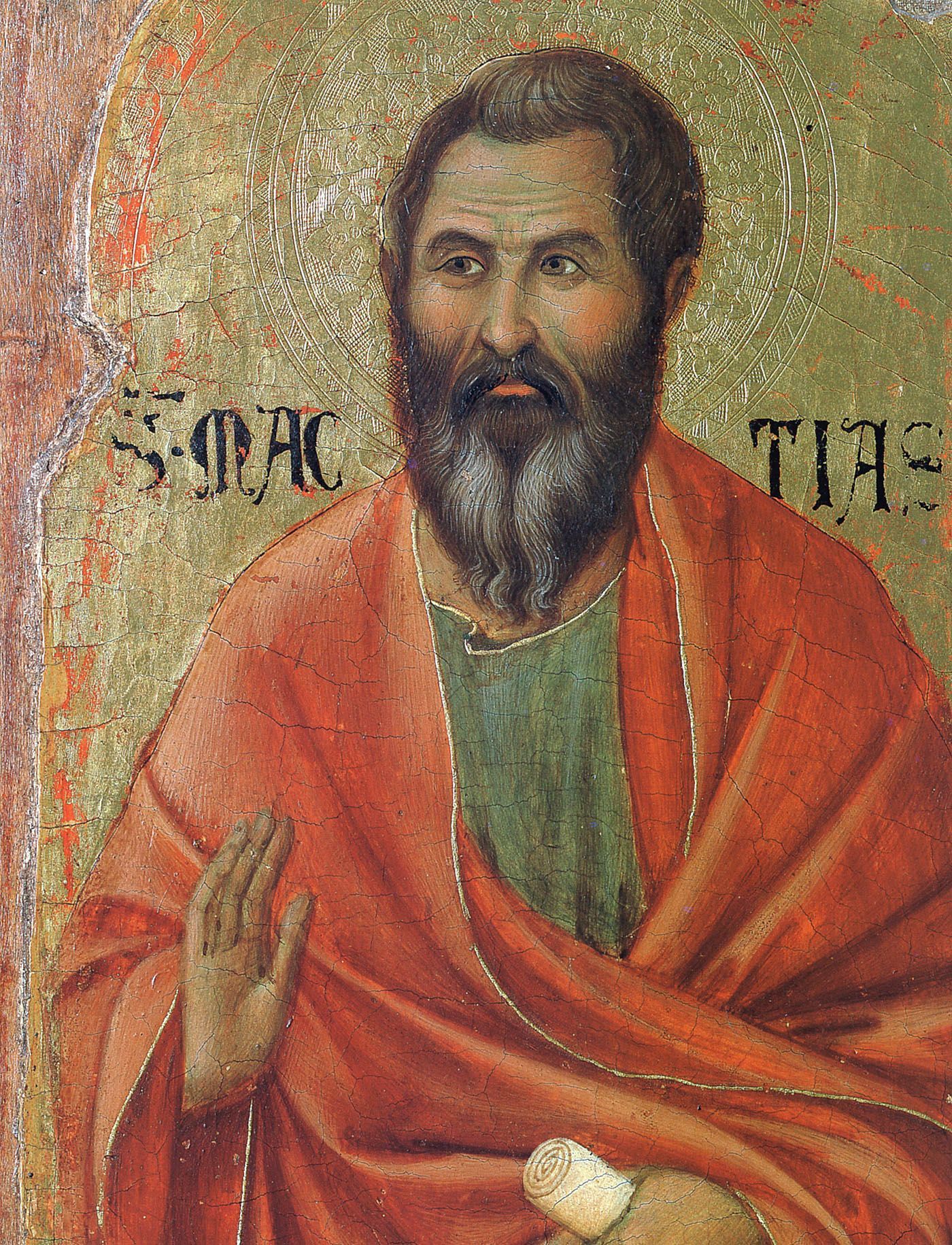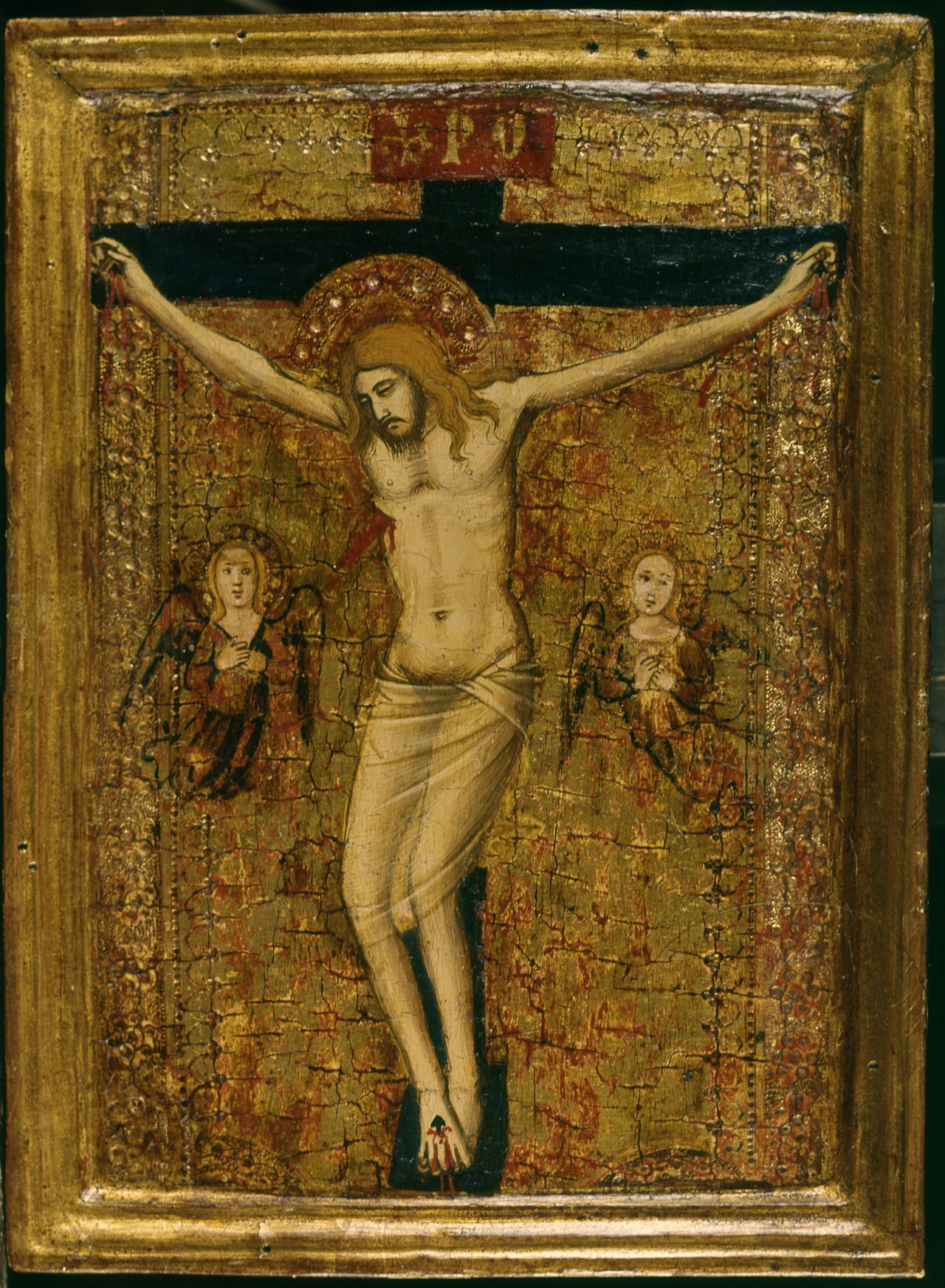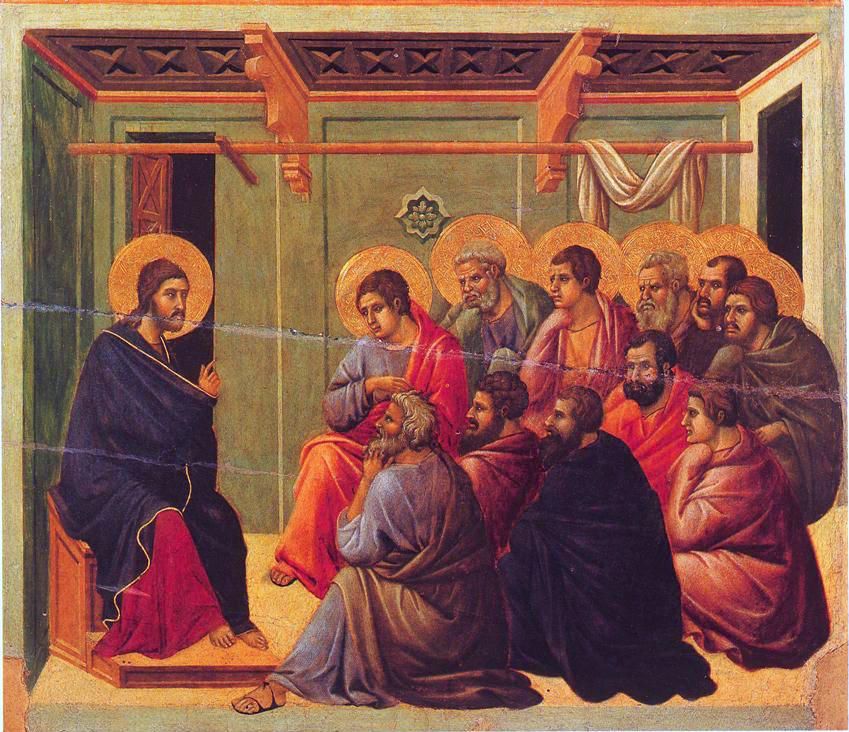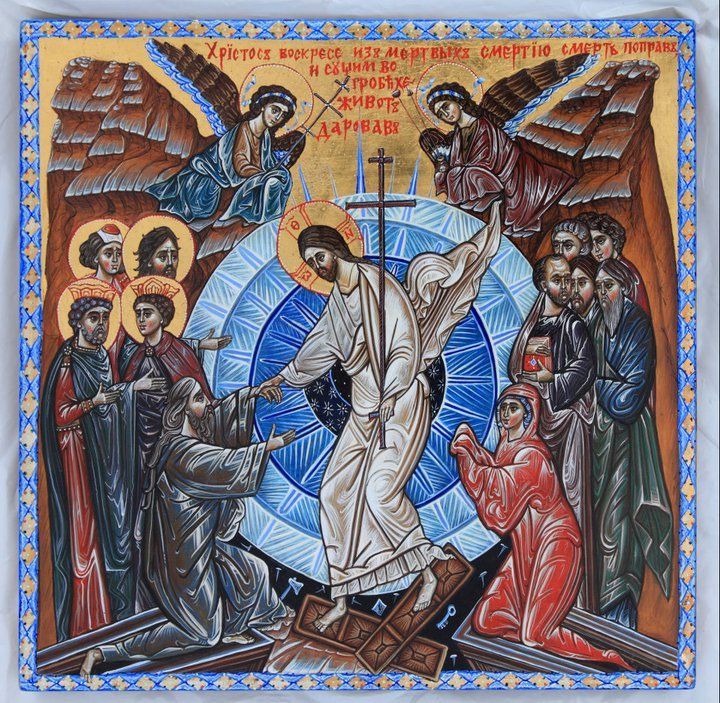
Today we keep the feast of St Matthias, chosen, as we heard in Sunday’s first reading from the Acts of the Apostles, to replace Judas Iscariot and so make up the number of twelve in the company of the Apostles. However, as we are reading the High Priestly Prayer of Jesus this week, I think it better to carry on with our daily meditation where we left off yesterday and hope to carry on tomorrow. Our Gospel reading takes us to Chapter 17 of John and the High Priestly Prayer of Jesus, with which his discourse at the Last Supper concludes. Today we read the first eleven verses. Jesus raises his eyes to haven and says: “Father, the hour has come: glorify your Son so that your Son may glorify you; and, through the power over all mankind that you have given him, let him give eternal life to all those you have entrusted to him. And eternal life is this: To know you, the only true God, and Jesus Christ whom you have sent.” The hour of Jesus is his Passion, Death and Resurrection, by which he glorifies the Father and he, in turn, is glorified by the Father, who has given Jesus all power in heaven and on earth. The power or kingship of Jesus is the power to do good and to save. In fact, by his Cross and Resurrection, he will redeem the world. The gift the Father gives us in the Son is the gift of eternal life, which means to know the one true God and Jesus Christ his Son, our Saviour and Lord. This knowledge we acquire though the Paraclete, the Holy Spirit, living within us and guiding us into all truth. Jesus also prays for his disciples, for each one of us too, “I pray for them; I am not praying for the world but for those you have given me, because they belong to you: all I have is yours and all you have is mine, and in them I am glorified. I am not in the world any longer, but they are in the world, and I am coming to you.” Jesus prays for us, as he knows only too well that, although we believe that he was sent by the Father to be our Redeemer, nevertheless our faith is not always strong and we easily lose that faith and give in to the ways of the world and the prevalent spirit of relativism and cynicism. He prays for us because we belong to God and need to be protected from that world of sin and unbelief, that surrounds us. Jesus says that he is glorified in us, by the sincerity of our faith and the integrity of our lives. Jesus looks to what now lies ahead in his mission as Saviour, his Passion, Death and Resurrection and then his Ascension, while his disciples remain to struggle on earth. We, as they, need the gifts and charisms of the Holy Spirit to see us through and help us follow in the footsteps of Jesus, offering our lives too for the salvation of all God’s creation. So, as we prepare to celebrate the Solemnity of Pentecost, we pray for a further outpouring of the Holy Spirit. Come, O Holy Spirit, come. Amen.

On this feast of Our Lady of Fatima, we continue to pray for peace with justice between Palestine and Israel and for an end to the destruction and killing. Let us also remember other parts of the world, especially Ukraine and Sudan, where conflict, war and acts of terrorism take place on a daily basis. These areas have dropped out of the headlines, but the suffering and injustice go on unabated and world leaders seem helpless to improve or change the situation. All thousands of children have ever known in their short lives is violence, bloodshed and death. This cannot be right or acceptable. According to John, it is at the Last Supper, during his farewell discourse, that the disciples finally proclaim their faith in Jesus and acknowledge him to be the Son of God. This is what we hear in today’s Gospel reading, (Jn 16: 29-33). It is because Jesus is speaking plainly to them and no longer in metaphors that they are able to say, “We believe that you came from God.” He replies: “Do you believe at last? Listen; the time will come – in fact it has come already – when you will be scattered, each going his own way and leaving me alone. And yet I am not alone, because the Father is with me.” We read these words in the context of his Ascension, but they are pronounced on the eve of his Crucifixion and Death. It is true that Jesus foretold perfectly what was to happen when he was arrested and tried by the high priests. The disciples did scatter and leave him alone to face his Passion, yet we know that the Father was always with him. Jesus had told them, “I and the Father are one.” Yet Jesus does not speak harshly, nor does he reprimand them, in fact, quite the opposite. “I have told you all this so that you may find peace in me. In the world you will have trouble, but be brave: I have conquered the world.” They are to find peace in his suffering and death, in the shedding of his blood. On Easter Day, when he appeared to his disciples in the upper room, he says, “Peace be with you,” showing them the wounds in his hands and his side. They are to find courage in the fact that he has conquered all that is evil and through his Death and Resurrection vanquished sin and death. May we find that same courage. Amen.

Today’s Gospel reading is taken from Chapter 17 of John, (Jn 17: 11-19), and is part of the concluding words of Jesus spoken at the Last Supper, part of what is known as his High Priestly Prayer. Jesus raises his eyes to heaven and prays to his heavenly father for his disciples, that they remain faithful and united to each other and to the Father in and through Jesus. “Holy Father, keep those you have given me true to your name, so that they may be one like us. While I was with them, I kept those you had given me true to your name. I have watched over them and not one is lost except the one who chose to be lost, and this was to fulfil the scriptures.” Jesus sees his disciples as a gift given him by his heavenly Father. He has kept them true to his name and prays that they will remain ever thus, that they might be united to one another as Jesus is to the Father. This is a prayer for unity as well for fidelity. Jesus, however, is now leaving his disciples to return to the Father from whence he came. He has taught his disciples, that his joy might be in them. “But now I am coming to you and while still in the world I say these things to share my joy with them to the full.” Jesus longs for the joy of the Spirit to fill the hearts of his disciples and transform their lives, even in suffering and persecution. He knows that if the world (those who reject God and his Anointed One) has hated him, whom the Father has sent into the world that the world might be saved, then it will also hate his disciples. “I passed your word on to them, and the world hated them, because they belong to the world no more than I belong to the world. I am not asking you to remove them from the world, but to protect them from the evil one. They do not belong to the world any more than I belong to the world.” Jesus prays that they be protected from all that is evil, beginning with the very source and spirit of evil. For this he asks the Father to consecrate them in the truth of his word. “Consecrate them in the truth; your word is truth. As you sent me into the world, I have sent them into the world, and for their sake I consecrate myself so that they too may be consecrated in truth.” Jesus consecrates himself that they might be consecrated in him, for he is the Way, the Truth and the Life. They will be strengthened and sanctified by the power and purity of his word, the word of truth. Lord, we pray today that we, like the first disciples and apostles, might be consecrated in the truth by Jesus, our Lord and Saviour. We pray earnestly for the gift of the Holy Spirit, that our lives might be transformed in such a way that we become icons of the Risen Christ wherever we may be. Amen.

Yesterday I had the great joy of spending the day with my mother. The weather was glorious from start to finish with the most wonderful sunset to greet me when I arrived back at Belmont. It was only my third visit home since Toby’s death, so the pain of bereavement was still raw, especially for my mother, who always looked forward to much to our visits. It also meant that I didn’t take a walk on the beach or visit the marsh to see if my favourite orchids are on the way to blooming. However, a dear friend rang us from Brighton and we had a lovely hour’s conversation with him by videocall, which set us up for the weekend. Our Gospel today takes us back to John, (Jn 16: 23-28), and continues our reading of Jesus’ farewell discourse to his disciples at the Last Supper. He asks them to pray, reminding them that whatever they ask for in his name, they will receive. “Anything you ask for from the Father he will grant in my name. Until now you have not asked for anything in my name. Ask and you will receive, and so your joy will be complete”. In the Lord’s prayer, Jesus taught us to say, “Thy will be done on earth, as it is in heaven,” so every prayer has to express the desire that God’s will, not ours, be done. Most surely then we will receive, and our joy will be complete. Jesus warns his disciples that the time is coming when he will no longer speak to them in metaphors but in plain words. “I have been telling you all this in metaphors, the hour is coming when I shall no longer speak to you in metaphors; but tell you about the Father in plain words. When that day comes you will ask in my name; and I do not say that I shall pray to the Father for you, because the Father himself loves you for loving me and believing that I came from God. I came from the Father and have come into the world and now I leave the world to go to the Father.” Because we love Jesus, the Father loves us, for he loves us in his Son. Christ is the prism through which God sees us and we see God. Jesus then announces his departure, which the Synoptic Gospels describe as his Ascension. John describes this as, “now I leave the world to go to the Father.” But Jesus will not leave his disciples alone and undefended, no, he will send the Comforter, the Holy Spirit, and through the Spirit, he will continue to be with them and even more so, for he will live in them and they will live in him. Lord, how can we thank you enough for the gift of the Spirit?

Today our Gospel passage from John, (Jn 21: 15-19), takes us on from the Last Supper to one of the post-resurrection appearances of Jesus to his disciples. It takes place on the shore of Lake Galilee, where Jesus has encouraged his disciples to cast out deeper into the waters for a miraculous catch and then shared breakfast with them. It’s at this point that we pick up the story, with the conversation between Jesus and Simon Peter. “After they had eaten, he said to Simon Peter, ‘Simon son of John, do you love me more than these others do?’ He answered, ‘Yes Lord, you know I love you.’ Jesus said to him, ‘Feed my lambs.’ A second time he said to him, ‘Simon son of John, do you love me?’ He replied, ‘Yes, Lord, you know I love you.’ Jesus said to him, ‘Look after my sheep.’ Then he said to him a third time, ‘Simon son of John, do you love me?’ Peter was upset that he asked him the third time, ‘Do you love me?’ and said, ‘Lord, you know everything; you know I love you.’ Jesus said to him, ‘Feed my sheep.’” Why would Jesus ask Peter three times whether he loves him? Could it be because Peter denied him three times? Or, perhaps, to make sure and confirm that Peter was making a firm commitment to the love that demands service and self-giving, for each time Peter replies that he does, even to the extent of becoming angry and impatient that Jesus should ask him three times, Jesus replies by saying, “Feed my lambs. Feed my sheep”. Do we love Jesus as Peter did and to what does that love commit us? Then Jesus warns Peter of what that love will ultimately lead to and the death he will face for love of Jesus. “I tell you most solemnly, when you were young you put on your own belt and walked where you liked; but when you grow old you will stretch out your hands, and somebody else will put a belt round you and take you where you would rather not go. In these words, he indicated the kind of death by which Peter would give glory to God. After this he said, ‘Follow me.’” You could say that the Gospel story begins with the calling of the first disciples, Jesus saying to those he has chosen, “Follow me.” Now the Gospel ends with the very same words, “Follow me,” for in life and in death, Jesus calls us to follow him, to take up our cross daily and follow him, to preach the Gospel by our faithfulness and humility, our love and generosity, by the very integrity of our lives. Let us remember those words of Jesus every day, no matter where we are or what we’re doing, in any and every circumstance, “Follow me.” May the Holy Spirit empower us to say with Peter, “You know, Lord, that I love you.” Amen.
The Acts of the Apostles takes over the story of the Ascension just where Luke’s Gospel leaves off. “Now as he blessed them, Jesus withdrew from them and was carried up to heaven. They worshipped him and then went back to Jerusalem full of joy; they were continually in the Temple praising God.” But before they return to Jerusalem, the angels ask them why they are standing there looking up into the sky. They tell the disciples that Jesus, whom they have seen ascending into heaven, will come back again just as they have seen him go. What is the meaning of the Ascension? The Gospel tells us that three things are going to happen as a result. Christ ascends into heaven and yet, (1) “Behold, I am with you until the end of time”, (2) “Not many days from now, you will be baptised with the Holy Spirit”, and (3) “The Son of Man will return on the clouds of heaven”. Although Jesus has ascended to the Father, he is still here with us, in the Church, in the Sacraments, in the Scriptures, and in each one of us. He is with us through the outpouring of the Holy Spirit, the “other Advocate, who will remind you of all that I have told you.” He will return on the Last Day to be with us again. The Ascension is the fulfilment of the prophetic name Emanuel, God-is-with-us. Human beings think in linear time scales: past, present and future, but with God, who is eternal, there is no past or future, only the present. Eternity has no length and cannot be measured. Eternal life is living fully in the present moment, living in God. The Ascension is a breakthrough, where time enters eternity, just as at the Incarnation eternity entered time. In the Ascension hymn “Hail the day that sees him rise,” Charles Wesley writes: “Lord, though parted from our sight, far above yon azure height, grant our hearts may thither rise, seeking thee beyond the skies. There we shall with thee remain, partners of thine endless reign; there thy face unclouded see, find our heaven of heavens in thee.” Heaven is not a place: Heaven is a person, Jesus Christ, and eternity is God’s life, which he has graciously shared with us, his children, through the death and resurrection of Jesus. The Gospel begins with an angel announcing the Incarnation, first to Mary and then to Joseph, and a choir of angels announcing the birth of the Messiah to the shepherds. The Gospel ends with an angel announcing the Resurrection to another Mary, and with Jesus, God’s own Angel, announcing the coming of the Holy Spirit to the Apostles, and with two angels announcing that Jesus will return. What, then, does the Ascension mean for us? Jesus, Word of God and Son of the Father, who took our human flesh from the Virgin Mary and became Man, thus uniting heaven to earth, God to Man, at his Ascension took into heaven, took unto himself, our human flesh, this frail, sinful body of ours. A part of us is already at the right hand of the Father, transfigured, glorified and eternal. The Ascension fills us all with joyful hope, because it is, of all the Church’s feasts, the feast of hope, joy and fulfilment, the feast that celebrates both a mission accomplished and a mission just beginning. When all seemed lost, Jesus rose from the dead and just when it looked as though he was leaving us for good, he tells us that he will be with us always, that he will never leave us. He promises us the gift of his own Spirit and he assures us that he will come again in glory and that all will be well, that our heaven of heavens will be truly in him. To Jesus Christ, our risen and ascended Lord, be all glory, praise and worship in time as in eternity. Amen.

Today is the Eve of the Ascension and our Gospel reading, (Jn 16: 12-15), prepares us for tomorrow’s feast. Jesus is about to leave his disciples to ascend to the Father. The interesting thing, of course, is that these words are recorded as having been spoken by Jesus on the eve of his passion and death. Jesus says to his disciples:“I still have many things to say to you but they would be too much for you now. But when the Spirit of truth comes he will lead you to the complete truth, since he will not be speaking as from himself but will say only what he has learnt; and he will tell you of the things to come.” Jesus is aware that his disciples can only take in so much and that they’re reaching saturation point. The time has come to draw the conversation to an end. There’s much more he would like to say, but there’s time, for the Holy Spirit, the Spirit of truth, will tell them everything and lead them into the full, complete and absolute truth. Everything they need to know and much more besides will be given them by the Spirit. Just as Jesus did the Father’s will and only spoke in conformity to the Father’s will, so too the Holy Spirit will not speak as from himself but from the Father’s heart. This is one if the highest expressions of trinitarian thought in the Gospels. In fact, it is the Spirit who will glorify Jesus, just as it is the Father who glorifies him. “He will glorify me, since all he tells you will be taken from what is mine.” The Spirit will bear witness to Jesus, for just as the Father and the Son are one, so too the Son and the Holy Spirit are one, for there is but one God. “Everything the Father has is mine; that is why I said: All he tells you will be taken from what is mine.” John is rich in theology and much of our understanding of God comes from this Gospel and the discourses of Jesus. The Son, the incarnate Word of God, can say that all the Father has is his, and, in the same breath, all that the Spirit will teach the disciples, in other words, the Church, comes from the Son, for Father, Son and Spirit are but one God. Father, as we meditate on the words of your Son today and take them to heart, we pray that we might live by them always. Give us the Spirit of truth to lead us into the complete truth, that we might come to know you even as you know us. Amen.
Not such a bad Bank Holiday after all! The sun is shining still here at Belmont as I write this message, and it’s warm. There’s been a dog show practice on the lawns before the monastery and the sound of happy dogs interacting and enjoying the exercises. The first big move to Leominster will soon be on its way: at least there will be plenty of pictures for the blank walls and a fridge to keep things cool and fresh. I am grateful to the brethren and to dear friends for their help, more than help in fact, for they have done all the work. I have never lived alone, so this will be a new experience for me, which I’m looking forward to. Of course, I had hoped to have Toby with me, but that was not to be. The Lord works in mysterious ways! Our Gospel reading today, (Jn 16: 5-11), continues where yesterday’s left off. We are in John’s account of the Last Supper and listening to Jesus talking with his disciples, preparing them for his death and what lies beyond. He says, “Now I am going to the one who sent me. Not one of you has asked, “Where are you going?” Yet you are sad at heart because I have told you this. Still, I must tell you the truth: it is for your own good that I am going because unless I go, the Advocate will not come to you; but if I do go, I will send him to you.” Jesus is about to return to the Father. His telling them this has saddened his disciples, but he assures them that he is not leaving them, but will still be with them through the presence of the Holy Spirit, the Advocate or Paraclete. He says that his going from them is for their own good, for unless he leaves them, the Advocate, the Spirit of truth, will not come to them. Jesus himself will send them the Spirit who proceeds from the Father. But what will the Spirit do? “And when he comes, he will show the world how wrong it was, about sin, and about who was in the right, and about judgement: about sin: proved by their refusal to believe in me; about who was in the right: proved by my going to the Father and your seeing me no more; about judgement: proved by the prince of this world being already condemned.” This is quite difficult to understand and to explain in a few words, but it is the work of the Holy Spirit to enlighten people and convince them of sin, judgement and faith. Essentially, what is sin but the rejection of God and of his Son, our Saviour Jesus Christ? On that sin will we be judged. Belief or faith is really trust and obedience, conforming our lives to God’s will and acknowledging that he knows what is best for us. Lord, increase my faith and grant me the grace each day to live by faith in you. Amen.

What a lovely change yesterday and this morning, at least, to have some decent warm sunny weather for a change. Has this been the coldest and wettest Spring ever? I seem to have been driving constantly through rain and negotiating flooded roads for the past months. It’s hard to believe that Summer is just around the corner. This week, with the help of community and friends, I will begin clearing my quarters at Belmont in preparation for the move to Leominster and Bromyard when I retire as Abbot at the end of the month. We continue our reading of John, (Jn 15: 26 – 16: 4), carrying on where we left off on Saturday. Jesus has spoken of the suffering and persecution that lie ahead for his followers. No doubt they are wondering how they will cope with this and respond. Jesus promises them the Advocate, the Paraclete. He says: “When the Advocate comes, whom I shall send to you from the Father, the Spirit of truth who issues from the Father, he will be my witness. And you too will be witnesses, because you have been with me from the outset. I have told you all this that your faith may not be shaken.” The Holy Spirit comes from the Father but is sent by the Son: an interesting dynamic. He is the Spirit of truth, who will bear witness to Jesus, just as his disciples will bear witness to Jesus. Although Jesus doesn’t say so at this stage, it is the Paraclete who will enable the disciples to bear witness with vigour and courage, for the Spirit of truth will be with them and will speak in them and on their behalf. Jesus wishes to tranquilize his disciples, lest they run away in fear. Jesus becomes more specific about the kind of persecution they will have to deal with, beginning with expulsion from the synagogue. “They will expel you from the synagogues, and indeed the hour is coming when anyone who kills you will think he is doing a holy duty for God. They will do these things because they have never known either the Father or myself. But I have told you all this, so that when the time for it comes you may remember that I told you.” The jump from expulsion by their coreligionists soon escalates into full-blown rejection and murder by “anyone” who thinks he is doing a duty for God or, indeed, for the state or the state religion. Those perpetrating such barbaric acts know neither Jesus nor the Father. Let’s be honest, 2,000 years on this is still happening. We need Christ’s assurance of the Advocate more than ever today, remembering that persecution takes many forms, some more subtle and destructive than others. Jesus is warning us today as he warned his first disciples back then. We must remember what Jesus promised us, that we are not alone and that the Paraclete, the Spirit of truth, will never let us down. Lord, grant us a permanent awareness of the Spirit’s presence in our lives. Amen.

Our Gospel passage for today, (Jn 15:9-17), is part of Jesus’ farewell discourse to his disciples at the Last Supper according to John, in which we find many of the themes and phrases that we have been meditating on over the past two weeks. “As the Father has loved me, so I have loved you. Remain in my love. If you keep my commandments you will remain in my love, just as I have kept my Father’s commandments and remain in his love. I have told you this so that my own joy may be in you and your joy be complete.” Just in that short passage, the verb remain, or better still, abide, occurs three times, the word joy, twice. The verb to love occurs twice and the noun love, three times. Finally, to keep the commandments appears twice. They are key words in John and occur more times as we go through his Gospel. Jesus’ love for us enables us to abide in his love, to live in and through his love, which is permanent and unconditional, if demanding, for it requires obedience to the will of God as manifest in the commandments. But that abiding in God’s love enables us to keep the commandments not out of fear, but for love’s sake, and therein lies our joy. “This is my commandment: love one another, as I have loved you. A man can have no greater love than to lay down his life for his friends. You are my friends, if you do what I command you.” We still find the words commandment and love, but a new word appears, friends. So great is Jesus’ love for us that he lays down his life for us, and now he calls us friends. Friendship implies obedience in the true sense of the word, to listen to the other, not superficially, but in the very depth of one’s heart, heart speaking unto heart, as St John Henry Newman wrote. A good meditation for today would be to consider the many ways in which we can lay down our lives for others and what true friendship really means. Jesus develops the theme of friendship and its implications, when he says to his disciples:“I shall not call you servants any more, because a servant does not know his master’s business; I call you friends, because I have made known to you everything I have learnt from my Father. You did not choose me: no, I chose you; and I commissioned you to go out and to bear fruit, fruit that will last; and then the Father will give you anything you ask him in my name. What I command you is to love one another.” There are several implications for the relationship between Jesus and his disciples: they are no longer servants or simply followers of Jesus; they have been chosen by him and given a commission, not simply to bear fruit, but to go out and bear fruit, fruit that will last. In other words they are given the mission to proclaim the Gospel and draw others into the fellowship of the Christian community, a community of friends; they are to pray and intercede for others, for the Father will listen to their prayers; above all, they are to love one another: that is the fundamental command of Jesus, love. Let us pray for the grace today and always to abide in Jesus, so that we might love others and he loves us, and return his friendship with our own, as we too give up our lives for our friends, Amen.






